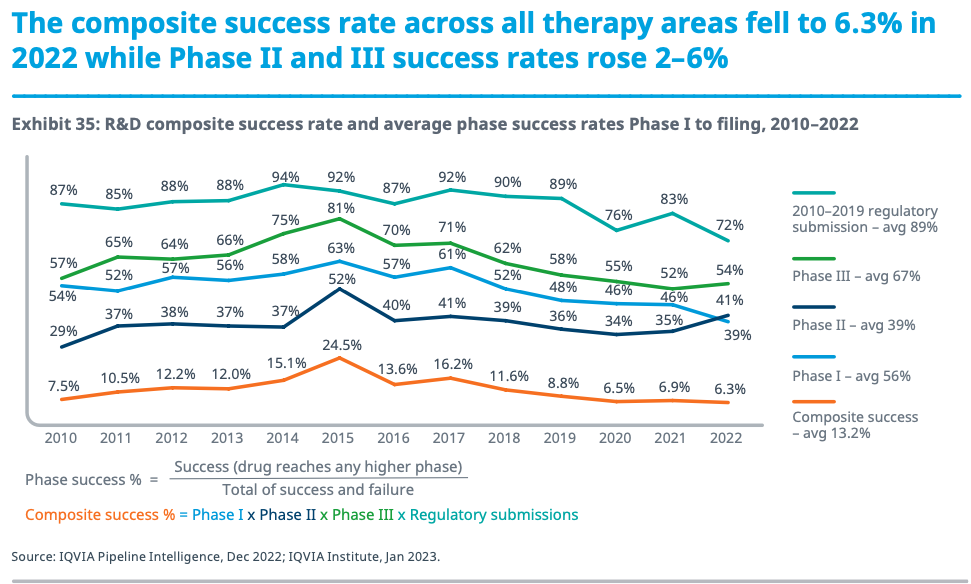
This article was triggered by a beverage-induced discussion I had with Martin Eglitis at BIO-Europe earlier this month.
In my licensing courses, I spend a bit of time talking about the probability of success as you move from phase to phase across clinical development.
I use Hay, 2014 as my reference for this course. In Hay, et al., the authors calculate a wide range of clinical success probabilities across multiple therapeutic areas and modalities. In some cases, such as multiple myeloma, there is enough data to calculate these probabilities for individual indications. Send us an email if you would like the PDF.
Now the Hay database covers the time period between 2003-2011, and so many new modalities are obviously not included.
Fortunately, IQVIA covers these data over time. In their most recent R&D report, IQVIA reports probabilities of clinical success over time (cf., their Figure 35 shown above).
Of interest is the general decline in R&D success rates.
For example, the probability of successfully promoting a candidate from Phase I into Phase II was ~63% in 2015. That has since fallen to ~39% in 2022.
Similarly, Phase III probability of success has fallen from 81% in 2015 to 54% in 2022.
The net result of all these data is that the composite probability of success from Phase I to Approval fell from ~25% in 2015 to 6.3% in 2022.
So, What’s Happening?
With something as complex as drug development, there are a myriad of potential causes of this decline in clinical development success.
In our view, the most likely explanation lies somewhere along these lines:
- The development of increasingly novel, increasingly complex technologies and modalities, which are by their very nature, more difficult (and hence, riskier) to develop;
- The development of increasingly complex small molecules;
- The pursuit of drug targets which are increasingly difficult to hit safely;
- The pursuit of indications which are inherently more difficult to treat, or to demonstrate a meaningful improvement over standard of care;
And so on.
In other words, we as an industry are attempting to do harder things, which are inherently riskier. This increased riskiness is being reflected in the probability of success data.
Role of Management?
Returning to the discussion with Martin, the subject of management experience and expertise came up.
The question which evolved after a few pints was something along the lines of the following:
Can the right management team with the right amount of scientific and drug development expertise have a probability of success that is significantly above industry averages (using the IQVIA data as “averages”).
Let us suppose that we are investors.
We want to build a new company around an interesting platform technology. This technology has the potential to produce multiple novel, First-In-Class candidates against targets untouched by known pharmaceutical agents.
Can we select a team of scientists and managers which can provide an above-average probability of success versus industry averages?
Or, if an existing team is “average,” can the team use “above average” consultants and service providers to increase the probability of success?
The null hypothesis in our thought experiment is that there is no difference between management teams. If so, then any differences in the probabilities of success are due to factors beyond the expertise of the team.
In other words, drug development is, to put it simply, darn hard to do.
There are simply too many variables and factors which are unknown, uncertain, and which can lead to development failure irrespective of the experience and expertise of the team.
Of course, I am not suggesting that we have a monkeys with typewriters scenario. Clearly there are individuals who are more talented and/or experienced than others when it comes to a particular discipline. Some medicinal chemists are better than others. Some toxicologists are better than others. Some cell biologists are better than others.
And yet, these talented individuals (who are now more accessible than ever) are not enough to overcome the incredible challenges we are undertaking in our industry.
So, does management matter?
I would never say that talent and management do not matter. Of course they do.
Every company must do the best they can to access the best talent available via direct employment, via consultants and service providers, and so forth.
But at the end of the day, what we are collectively doing in our industry is damned hard to do.
Cell therapies? Gene therapies? Gene editing? This could all be science fiction from 25 years ago, and yet they are a reality today.
I do believe these probabilities of success will improve over time, especially as we understand these new modalities better and better.
Also, AI will play a critical role in developing this understanding because it will take AI tools to process massive amounts of data (granted, much of it behind closed doors) and develop new insights into how to develop these candidates successfully.
